“We were going to the Old World to find a new rhythm to our lives.”
In his novel, Tender is the Night, F. Scott Fitzgerald recounted the cheap rents, the fast women, and the boozy, jet-set parties that have immortalized the seaside resort town of Juan-les-Pins.
During the Jazz Age, F. Scott and Zelda Fitzgerald made it their playground. As did others of the jet-set: Hemingway, Picasso, the Murphys, the Valentinos, and Cocteau.
Today, while the town continues to draw the moneyed-class, its former glory is in retreat, the grand mansions of old now dwarfed by ill-advised condo blocks.
My senior researcher, Margaret Summerfield, is there to take a look.
Last week, Margaret wrote to you from the French town of Antibes on the Côte d’Azur. (You can read her piece here.) She’s in search of a European base and leaving no stone unturned.
This week, she’s taking an expedition to the other side of the Cap d’Antibes to see what hidden treasures she can find in Antibes jazzy younger-sister, Juan-les-Pins.
Read on…
Where Did You Go To, My Lovely?
By Margaret Summerfield
There’s an old 1960s pop song called Where Do You Go To, My Lovely.
It’s a cheesy kind of song, sung by a guy with big hair and a big moustache.
One part of the song goes: “When you go on your summer vacation, you go to Juan-les-Pins.”
The lyrics flashed through my mind some days back when I accidentally walked to Juan-les-Pins. I was on the hunt for tarte tatin (an apple and pastry delight that you should try if you’re ever in France). Friends and colleagues know that I’m old school, preferring printed maps, asking directions from locals, and wandering-until-you-find-it rather than using a clever app on a smartphone.
I started in the center of Antibes. I knew more or less where I was headed. But I took a wrong turn. And the next thing I saw was a sign welcoming me to Juan-les-Pins. Oh well, I figured, let’s go see the sights.
And with the lyrics in mind and camera in hand, off I went.
If I hadn’t seen the sign, I would never have guessed this was the Juan-les-Pins so many folks rave about. It’s out of season, sure, so the beaches aren’t pristine and folks aren’t sunbathing and swimming. The beaches have piles of seaweed and flotsam instead of the careful manicured sand you see in the summer.
I was expecting all of that. But at first, I couldn’t see why the “Lovely” in the song had bothered going to Juan-les-Pins at all.
The beaches run alongside a street that locals say is crazy-busy in high season. Behind that, there are rows of 1960s and 1970s condo blocks, faceless and charmless, over-development at its worst. I saw a few old 1920s and 1930s buildings that look like they’re about to be demolished (and, I’ll bet, replaced with more faceless condo buildings). There were bars, supermarkets, restaurants…and a has-been vibe…in the downtown area.
On subsequent visits, Juan-les-Pins grew on me. I can’t imagine I’d ever enjoy it in high season, but out of season, the beach and boardwalk are great for an early morning walk or jog.

And I did find some traces of the town’s glory days.
At one end of the boardwalk, in front of the train track, there’s a neo-Moorish house, brilliantly white and featuring a minaret tower. It was originally called Villa El Djézaïr, but now it’s Villa Djunah. It was built by architect Ernest Truch in 1922 for Camille Chrétien. Chrétien wanted a home that reminded him of his travels in Algeria. Today, the house is a restaurant and bar.
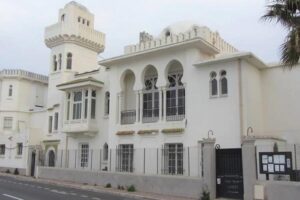
Back towards the center of Juan, there’s a cluster of 1920s and 1930s buildings.
This is Palais Beau Rivage, built in classic Art Deco style, but looking a little shabby today. According to local news reports, four buildings were demolished around it, and the plan was to build a luxe hotel and spa, due to be finished by 2022. That’s looking a little optimistic.

The Pin Doré building close by has some wonderful friezes that really catch the eye. It mixes Art Deco and Provencal touches, with large vases, round windows and wrought-iron balconies:

The Pin Doré is a short walk to the Palais Wilson, designed by Russian-born architect, Georges Dikansky. At street level, it doesn’t look impressive, but look up and you’ll see some gorgeous mosaics. There are two buildings, this second one is behind the first, and is similar in style.
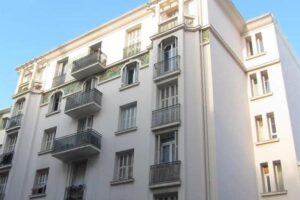
To reach the next historic building, you go past the Pam Pam bar. While it’s not of any architectural interest, it has hosted famous names such as Rita Hayworth, Ella Fitzgerald, and Glenn Ford.
Hotel Le Provençal encompasses the early history of Juan-les-Pins. In 1924, the town’s newly renovated casino had a grand opening. Among the guests was Frank Jay Gould, son of Jay Gould. Jay Gould is described in his Wikipedia entry as a railroad magnate and financial speculator…and also a “robber baron” whose unscrupulous business dealings made him one of the wealthiest men of the late 19th century.
His son, Frank Jay, invested in the development of Juan-les-Pins. He built the Le Provençal, with the first stone laid in 1926. It attracted guests like Charlie Chaplin, Coco Chanel, Marilyn Monroe, Jack Warner, and Man Ray.
Frank Jay Gould died in Juan-les-Pins in 1956. The hotel closed in 1976. Then started a dance to get permission to transform it into apartments. A construction permit was obtained in 1998…work started in 2001… the license expired in 2003. The owner sold to Cyril Dennis, a British billionaire. The project started again…then stalled in 2009 with the global slowdown…and fire damaged it in 2012. In 2015, Dennis sold to another British billionaire, John Caudwell. He’s selling luxury condos on part of the lot, starting at €850,000 for 905 square feet. But the hotel is still a ghost, a shell, a sad reminder of its glory days.

Continuing past the hotel along the road to Cap d ‘Antibes, you’ll pass Villa Picolette, a colorful mix of cut stone, a loggia, and friezes. F. Scott Fitzgerald stayed here in the 1920s. It went up for sale in 2013, with an asking price of €27.5 million. The most recent listing had it listed at just over €51 million. You can see it below on the right, with its ultra-modern neighbor.
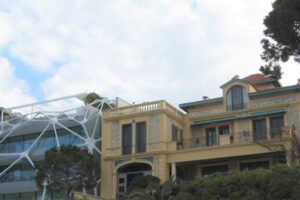
Villa Picolette, once a summer home to F. Scott Fitzgerald, now lists for €51 million.
Picolette is very close to the Belles Rives hotel, a favorite haunt of Fitzgerald (there’s a piano bar named in his honor, and even a Gatsby cocktail). Fitzgerald lived there when it was a private villa, where he and his wife Zelda entertained friends like Ernest Hemingway and Rudolph Valentino. In 1929, the villa became a hotel.
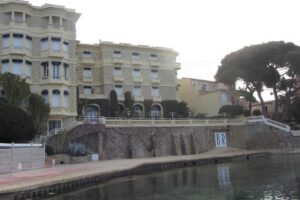
Next to the Belles Rives there’s Villa La Vigie, in a neo-baronial style.
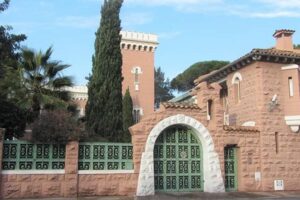
Villa La Vigie was visited by many artists in its day, including Jean Cocteau, Estée Lauder, Charlie Chaplin, and Pablo Picasso who, during a stay, painted the walls.
Built by an eccentric American, it was bought by Frank Jay Gould and his wife Florence. Pablo Picasso stayed in the villa and reportedly painted the walls—but the Goulds didn’t like it and had them painted over.
This house, Chateau de Juan-les-Pins, is in a style that I call “wedding cake”—elaborate, ornate, a white monster.

It was built in 1860 and was the residence of Queen Emilie of Saxony. In 1914 an American perfumier, Richard Hudnut, bought it. He and his daughter and her husband, Rudolph Valentino, stayed here in the summer months.
The road from the chateau all the way to the Cap is lined with huge homes and villas. There’s even a Billionaire’s Bay, packed with bank-busting mansions owned by Russian oligarchs, Middle Eastern royalty, and the world’s wealthy. It’s hard to see anything past the high walls and security fences. If you’re on foot, you can catch tantalizing glimpses, but not much more.
But what about real estate in Juan-les-Pins for us mere peasants?
Compared to Cannes, Juan-les-Pins’ real estate market almost looks “affordable”. For €500,000 in Cannes, you won’t get a centrally located condo with a big sea view. But you can get a one-bed condo in Juan-les-Pins overlooking the boardwalk and beach for €515,000.
Away from the beach (and a long way from Billionaire’s Bay), you can find a tiny studio for €149,000 or €285,00 for a two-bed condo.
The problem is that your view won’t be looking out onto the sparkling Mediterranean but rather another generic condo block. If that’s a sacrifice you’re willing to make to walk in the footsteps of the Jazz Age greats, and to enjoy the fabulous French quality of life, there are certainly worse places to buy.
However, “affordable” is relative. Leave the French Riviera behind…and on the Real Estate Trend Alert beat, you can buy brand new luxury condos in beachfront communities or with ocean views for under $200,000…with big potential gains, both from capital appreciation and rental returns.
Ronan says: We have seen the same pattern play out time and time again. The jet-set bring a place into vogue, then the rich come and build their mansions, prices spike, and finally a new price floor is established, based on the intrinsic appeal of a glamourous destination.
This reminds me of the Cabo of today. Multi-million-dollar yachts moor in the deep blue waters of the Sea of Cortez. The hills sloping down to the shoreline and its white-sand beaches are dotted with luxury homes. Add in a layer of jet-set amenities like luxury hotels, posh spas, world-class golf courses, and great dining spots, and you can see why so many want to visit—or own a home—in Cabo.
Cabo has long been synonymous with the rich and famous. Hollywood stars first started to vacation here back in the 1940s. They put Cabo on the map and flagged it as a high-end destination. Big-money visitors have been coming to Cabo ever since…movie stars, presidents, fashion models, tech billionaires.
The ordinary rich followed the famous and super-wealthy. They vacationed on Cabo’s sun-drenched beaches, relaxed at the luxurious day spas, and played golf on Cabo’s iconic courses. Many bought second homes here.
Cabo’s proximity to some of the wealthiest cities in the U.S. is a major factor in its success. It’s just a three-hour flight from Houston and San Francisco, two hours and 20 minutes from Los Angeles, and two hours from San Diego.
The lifestyle in Cabo is another big factor. It’s like that of California back in the day. The landscape, too. That’s hugely appealing both to those who are relocating and those who are vacationing. These days in California, you can’t drink a beer on many beaches, the traffic’s a nightmare, and the housing is pricey. Those who wanted that California lifestyle of old came to Cabo for it. They wanted a home to match the comfort of California. They were happy to pay a premium to get that. They splashed out on fancy homes and condos with sky-high price tags.
Those who couldn’t afford a multi-million-dollar condo spent hundreds of thousands of dollars on a timeshare—the right to stay in Cabo a few weeks a year. That’s a really good indicator of how desirable Cabo is.
And it’s that demand that underpins our upcoming opportunity in Cabo. The difference is that we’re using our RETA group buying power to lock in major discounts on best-in-class real estate.
Our condos will be perched on a hill just outside Cabo with stunning views of the flat azure waters of the Sea of Cortes. Cabo San Lucas itself is only seven minutes away…and the pristine Cabo beach only three or four. Two-bed, two-bath condos will have big terraces that make the most of these views. The views from the community pool area are simply drop dead gorgeous.
Our RETA-only price is from a remarkable $188,000. Unheard of in Cabo. I figure these condos will be worth $330,000 within three years of delivery. And that’s not to mention the huge rental potential, fueled by booming demand.
RETA members can stay tuned for more details.
Your Daily Dream Home
Torrevieja, Costa Blanca, Spain
€88,500 ($107,629)
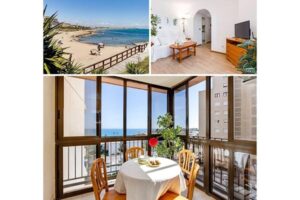
About a 20-minute drive from the airport in Alicante is the resort town of Torrevieja on Spain’s Costa Blanca. This two-bed, one-bath apartment is in the La Mata area of Torrevieja and has views of the sea from it’s balcony. Recently renovated, it has air conditioning, a fully fitted kitchen and a dining/living area that opens out onto the balcony. The bedrooms also have access to the balcony. This beautiful apartment comes fully furnished and is just a few minutes walk to the area’s golden sand beaches.
Remember, we don’t make money from any listing shared here in the Your Daily Dream Home section. We have no dog in the fight. We’re just sharing cool properties we’ve found.
I haven’t visited this property or done due diligence on it. If you’re interested in the listing, you should hire an attorney and do your own due diligence.
Get Your Free Real Estate Report Now
Sign up for our free daily Postcard e-letter and get a valuable free report on the The 5 Best Places to Buy Real Estate In 2023.
Related Articles
Is Cozumel The Next Stop on the Path of Progress?


